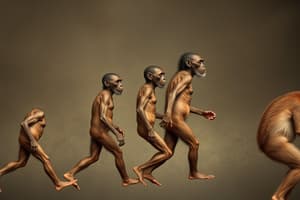Podcast
Questions and Answers
What is an example of a maladaptation mentioned in the text?
What is an example of a maladaptation mentioned in the text?
Sickle cell anemia
What are the two building blocks to study the bioecology of human health?
What are the two building blocks to study the bioecology of human health?
- Infectious diseases and Parasites
- Genetics and Environment
- Adaptation and Maladaptation (correct)
- Physical stresses and Physiology
Inherited conditions like sickle cell anemia can affect human health in both positive and negative ways.
Inherited conditions like sickle cell anemia can affect human health in both positive and negative ways.
True (A)
Parasitic infections often follow human cultural practices like agriculture or water management, resulting in large-scale ______________ problems.
Parasitic infections often follow human cultural practices like agriculture or water management, resulting in large-scale ______________ problems.
Study Notes
Ecology and Health
- The relationship between health, ecology, and evolution is complex and defies simple causality.
- Ideas of disease have been at the center of discussions about the ecological context in which humans evolved.
- Physical stresses have shaped an adaptive human morphology and physiology.
- Some diseases, like TB and HIV/AIDS, reflect recent ecological conditions and have emerged within specific social and economic contexts.
- Diseases like malaria are as old as humanity itself and can be found in the fossil record.
- Malaria's presence in the fossil record provides information about the environment, diet, and behavior of early hominids.
- The concepts of adaptation and maladaptation are crucial in studying the bioecology of human health.
- Adaptation refers to physiological and morphological changes that are beneficial.
- Maladaptation refers to traits that were adaptive in an ancestral environment but can contribute to dysfunction or disease in changed conditions.
- Sickle cell anemia is an example of maladaptation, where it is an adaptation providing some immunity against malaria but can also contribute to disease.
Infectious Diseases and Human Ecology
- Infectious diseases have played a major role in human ecology and social evolution.
- The emergence and spread of infectious diseases are strongly dictated by changes in land use, agriculture, the domestication of animals, and population density.
- Infectious diseases can influence social structures and behaviors, such as the stigmatization of people with leprosy in the Middle Ages.
- Parasitic diseases are examples of the intimate connections between human cultural practices and natural biological processes.
- The spread of parasitic infections often follows human cultural practices like agriculture or water management, leading to large-scale health problems.
Environment and Health
- The concept of "environment" includes the physical, biological, cultural, social, and mental milieus that humans occupy.
- Stress and mental illness are examples of how cultural and psychological factors can impact health.
- Social support networks among mothers can have a positive impact on the health outcomes of their children.
- A health professional's role is to understand the broad spectrum of influences that impact health, from genetic predispositions to the effects of climate change on health.
- Awareness of these different scales allows for a comprehensive approach to health that considers all relevant factors in diagnosis and treatment.
Studying That Suits You
Use AI to generate personalized quizzes and flashcards to suit your learning preferences.
Related Documents
Description
Explore the complex relationship between health, ecology, and evolution in humans. Learn how ecological contexts and physical stresses have shaped human morphology and physiology.





